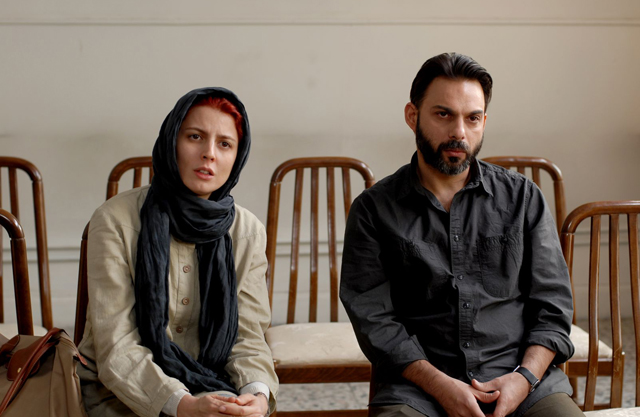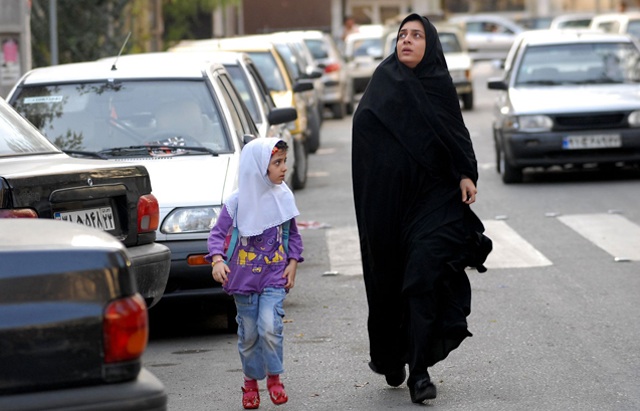 Rating: 4.0/5.0 |
CHICAGO– Divorce, aging parents, economics, religion and social standing can be applied to any circumstance in any modern culture. The culture in Iran may seem mysterious, but there is nothing uncommon regarding what their people go through in the Oscar nominated “A Separation.”
Winner of the Golden Globe for Best Foreign Language Film, and nominated for an Academy Award in the same category, “A Separation” is a universal example of how one problem can trip a wire to many problems. Viewed through the filter of the patriarchal society of Iran, those problems offer even more intensity, with the women becoming both the arbiters of the solutions and the victims of what future may result from those solutions.
Nader (Peyman Moadi) and Simin (Leila Hatami) are shown in the beginning as requesting a divorce in an Iranian court. There is no major conflict, it’s just that Nader refuses to leave his aging and senile father (Ali-Asghar Shahbazi) and Simin wants to take their daughter Termeh (Sarina Farhadi) and move away. The judge refuses to grant the divorce, so the couple begins a separation.
 Photo credit: Sony Pictures Classic |
The major circumstance of this split is that Nader needs to find day care for his father. After several meltdowns, he reluctantly hires Razieh (Sareh Bayat), who is pregnant and complains about the commute and the work. When Nader comes home to find the old man on the floor, tied to his bed, he physically throws Razieh out of his home. The angry woman falls down the apartment stairs, which sets off a legal battle to determine if Nader assaulted her. Razieh’s husband Hodjat (Shahab Hosseini) is now involved, and even Simin comes back to try and placate a volatile situation.
If there is any distinction that opens a window to the Iranian society, it is evident in the repression of true emotion and legal solutions. No one was nurtured to express feelings naturally, so the repressed sentiments often explode into inappropriate behavior. The fear that Razieh has regarding her lack of money and problematic pregnancy pushes her to the extreme, which pushes Nader to the extreme, and so on. Simin can’t get a no-fault divorce so she leaves a beloved daughter to fend with a depressed father and senile grandfather. All these problems are in search of solutions, which mostly could be rectified by letting go.
Director Asghar Farhadi, interviewed by HollywoodChicago.com, was insistent that he wasn’t expressing any gender issues in the film, but rather looking at the swirl of extreme feelings that are generated in all people when going through a crisis. But the most exceptional poignancy lie in the women, simply because of their potential future as a result of the decisions made in getting past the problems. Razieh’s grade school daughter is exposed to horrible adult behavior and teenage Termeh is torn between two parents/two worlds. Razieh herself is doomed to a dreadful marriage and a handcuffed religious tradition.
Director Farhadi gets a natural, honest performance from each of his actors. That honesty is raw, and there is an acute reaction of voyeurism when viewing the difficulties. It almost feels like a reality show or a documentary, but the camera never blinks. It is fearless writing, direction and performing, for Farhadi no doubt expresses some of the flaws in Iran’s social systems, class structures and religious oppressions.
 Photo credit: Sony Pictures Classic |
For all the glimpse into the Iranian culture, the essential problems that are familiar to all societies – bad marriages, old age care, tight finances and terrible adult behavior in crisis – are familiar to every one. In what we think separates Iran from the rest of the world, in essence is common to all, united in the strange trip of just living. Where and when we live is merely an accident of birth.
If anything, “A Separation” proves that nothing can be solved by trying to salvage a fatally torn relationship, marriage or otherwise. Bringing the curtain down on the first act, can get the players on the road to a better conclusion in the subsequent acts of life.
 | By PATRICK McDONALD |